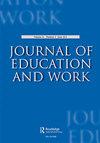SAGE学习与工作手册–2022
IF 1.7
Q2 EDUCATION & EDUCATIONAL RESEARCH
引用次数: 0
摘要
过去十年是一个多重社会危机和变化的时期——2008年经济危机和紧缩政策的持续影响,气候紧急情况的加速,数字化社交媒体的发展和第四次工业革命的创新,以及COVID大流行的影响。21世纪的这些挑战构成了越来越多的关于工作和学习的研究、理论和实证研究的背景。该SAGE卷(2022)每十年出版一次,提供了一个机会来反思工作和学习环境的变化,确定概念挑战并了解实践中的发展。本书的功能是为研究人员、培训人员、高等教育机构、职业教育和培训机构、企业和专业协会提供领先的国际资源。《手册》内容丰富,包括四个部分,共40章。编写这样的智力资源不是一件容易的事。为了响应SAGE及其营销需求,编辑团队制定了一份概述,试图捕捉新出现的趋势,以框架潜在主题和需要解决的关键问题。以下四个部分构成了主要结构。本文章由计算机程序翻译,如有差异,请以英文原文为准。
The SAGE Handbook of Learning and Work – 2022
The past decade has been a time of multiple societal crises and changes – the ongoing effects of 2008 economic crisis and policies of austerity, an accelerating climate emergency, the growth of digitised social media and innovations of the Fourth Industrial Revolution (4IR) and the impacts of the COVID pandemic. These challenges of the twenty-first century constitute the background to a growing body of research, theorisation and empirical studies on work and learning. This SAGE volume (2022), published every decade, presents an opportunity to reflect on changes to the context of work and learning, to identify conceptual challenges and to understand developments in practice. The volume functions as a reference work providing a leading and international resource for researchers, trainers and higher education, vocational education and training organisations, enterprises and professional associations. The Handbook is a large and diverse volume comprising four sections and totalling 40 chapters. Compiling such an intellectual resource is not an easy task. In response to SAGE and its marketing requirements, the editorial team developed an overview that attempted to capture the emerging trends to frame potential themes and key questions to be addressed. The following four sections constitute the main structure.
求助全文
通过发布文献求助,成功后即可免费获取论文全文。
去求助
来源期刊

Journal of Education and Work
EDUCATION & EDUCATIONAL RESEARCH-
CiteScore
2.70
自引率
14.30%
发文量
40
期刊介绍:
The Journal of Education and Work is an international forum for academic research and policy analysis which focuses on the interplay of the education and economic systems. The journal examines how knowledge, skills, values and attitudes both about and for work and employment are developed within the education system. The journal also explores the various forms of industrial training and accreditation in the economic system, including changes in the economic and industrial infrastructure which influence the type of employees required. Work in the informal economy is also included.
 求助内容:
求助内容: 应助结果提醒方式:
应助结果提醒方式:


